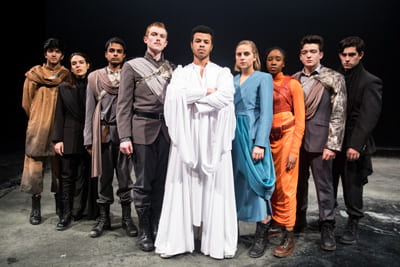I can easily tell you where 99% of our theatre majors are during the hours of 6pm to 10pm on any given weekday: rehearsal. In Northwestern’s theatre program, “rehearsals” vary greatly: they can be for a play or musical, Shakespeare or contemporary work, staged reading or improv comedy. The marvelous thing is that the majority of these rehearsal processes are entirely student-run – they’re produced, directed, designed, marketed, fundraised and performed by undergraduate students. I know what you’re thinking: how is that possibly sustainable? Karina, how does this student-driven process not crash and burn?
The Northwestern student theatre scene is a little bit like organised chaos, but in the best way possible. Structurally, everything is sound. We have nine theatre “boards” which function like mini theatre companies, each fit with their qunie artistic and executive directors, marketing managers, and production managers. These boards put up a certain amount of shows a year. This requires a performance space, rehearsal spaces, and a team of students outside of the board specifically dedicated to keeping that project afloat. Every quarter, we participate in a big weekend of auditions, which Northwestern students call “Generals,” followed by a week of callbacks, followed by cast lists. We have a system. My favourite part of this system is that it is not designed to prevent failure. Instead, it is designed to normalise failure.
When a five week process is managed entirely by students, things are bound to go wrong. They inevitably, always do. Failure in this context, therefore, is not to be feared but expected. This expectation makes damage control a part of the process, making us quicker thinkers and better problem solvers. I directed a show this quarter and our tech week was a nightmare: set pieces fell through, lights were not operational, and one of my actors was out sick until the night before we opened. Did we panic? Yes. Did we deal with it? Yes. We sourced set pieces from family friends and people’s dorms, worked on the lights for hours and hours until they finally worked and had the stage manager learn an entire role just in case. Even though it made the week far more stressful than it needed to be, all of these mishaps allowed me to really practice problem solving in a situation where the stakes actually feel high. I learned a lot of things from directing a show here, but perhaps the most important lesson of all was about how to approach challenging situations with a can-do attitude and a level head. And, ultimately, there is nothing like seeing your show go up on opening night in all its glory not in spite of the trials and tribulations, but because of them.

That sounds so cool!
This sounds so fun!! Are any of these student productions open to non-theatre majors? I’m looking into student life at Northwestern and theatre has been a huge part of my life that I hope to continue in the future- thank you 🙂